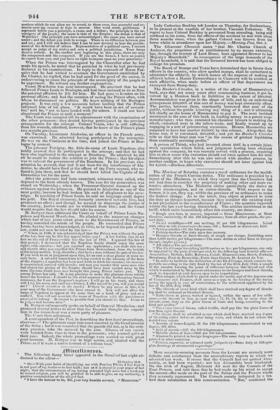etliscellaneous.
The following funny letter appeared in the Stanch:7.cl last night ad- dressed to the editor-
2d Ootaber 1840.
" Sir—With your habit of identifying me with Pontius Pilate, I feel that it is not part of my business to find fault ; but as it is stated in your paper of last night, that the circumstance of my having attended high mass has a tendency to wound religion, you will be gratified to be able to give, on my authority, a positive contradiction of the alleged fact. " I have the honour to be, Sir, your very humble servant, " MORPETIL"
Lady Catherine Buckley left London on Thursday, for Gorharnbury, to be present at the nuptials of her brother, Viscount Folkstone. We regret to hear Colonel Buckley is prevented from attending, being still
confined to his room, from the effects of the accident lie met with about three months since, when the gallant Colonel was thrown from his horse whilst in attendance upon her Majesty.—Morning Post, Oct. 2.
The Gloucester Chronicle states "that Mr. Charles Church of Andover, the proprietor of an establishment by no means extensive,
has, through the interest of Lord Bruce, been appointed Brewer to her Majesty's Household." In consequence of the large demands of the Royal household, it is said that the favoured brewer has been obliged to enlarge his premises.
The Board of Stamps and 'Faxes have determined that in future their officers in the country, who allow spoiled stamps, shall be authorized to
administer the affidavit, by which means all the expense of making an affidavit before a Master Extraordinary in Chancery will be avoided, as such affidavits, when made before an officer of that department are exempted from Stamp-duty.
The Banker's Circular, in a notice of the affairs of Hammersley's bank, says that not many years after commencing business, it got in- volved by a Honiton bank in liabilities to the extent of 280,000!. Accommodation was given in the shape of bills, and by an understood arrangement 200,000/. of this sort of money was kept constantly afloat.
The parties, between them, continually borrowed that sum of the
public, 'without the public knowing any thing of it ; and it ultimately fell chiefly on the house of Hammersley to pay it. The next incident mentioned in the case of this bank is, lending money to a patent soap- manufacturer; who then extended his chemical labours to making the alkali, embarked next in the tallow-trade, and finally wound up by
engaging in a sort of privateering excursion. Messrs. Hammerley are supposed to have lost another 80,000/. by this scheme. Altogether, the house lost, it is calculated, 260,0001.; and yet the Bunker's Circular tells us that this large sum was "in the course of gradual liquidation from continually accruing profits."
A person of Thirsk, who had invested about 200/. in a certain joint- stock speculation which failed, and judgment having been obtained
against the company, be was recently served with a process, requiring him to show cause why execution should not issue against him for 300/. Immediately after this he was also served with another process, by another creditor, to know why execution should not issue against him for 4,000/.—Durhum Advertiser.


























 Previous page
Previous page